Everybody likes the idea of exploration – but when we engage with it historically, the reality is less fun. Indiana Jones is an evocative character, and a game that offers that sort of adventure ought to be a blast, right?
Papua is a dice allocation/worker placement hybrid game where players are explorers on a scientific expedition to Papua (the portion of which is now known as Papua New Guinea).
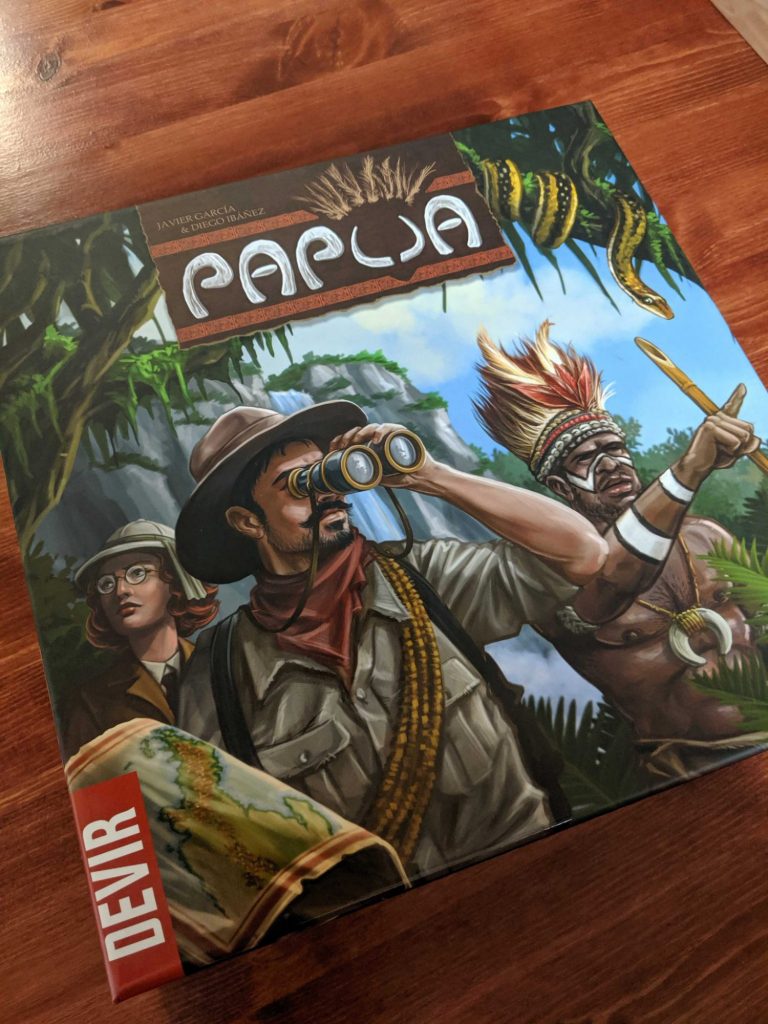
I found the game to have an interesting and novel take on several different mechanics that might be familiar to a savvy gamer, as they can be found in slightly altered forms in other titles. My overall play experiences in terms of actual gaming with this one was, for lack of a better word, fine.
This is not a game that I will be keeping in my regular rotation for two reasons: one, I have a serious problem with the way this game presents itself, and two, I was not excited by the play experience, which is probably connected to the theming. Why? Let me explain.
Playing at Exploitation
In this reviewer’s opinion, board gaming has a problem with the way that it addresses history, in this case, the history surrounding colonialism. As far as the designers and publishers are concerned, I do not know if the thought process that resulted in this game’s theme was a combination of thoughtlessness, carelessness, or a desire to tuck away history that makes people (particularly white people) uncomfortable, but it is a problem.
Games that place history as a focus often do not have a problem drilling down into the historical aspects of war and its surrounding environs, but when it comes to engaging with the history of European powers subjugating native peoples and subjecting them to exploitation, slavery, and violence, there is a marked degree of silence.
I do not want to pick on Papua, which in the context of other games, has a fairly benign appearance. There are hundreds of other titles that share the same wheelhouse of problematic presentation, but Papua was a game I was sent to review, so I will use it to illustrate some things that I see as unacceptable in gaming. If we want to celebrate diversity in this hobby, and bring in fresh perspectives and outlooks, this sort of thing has gotta stop:
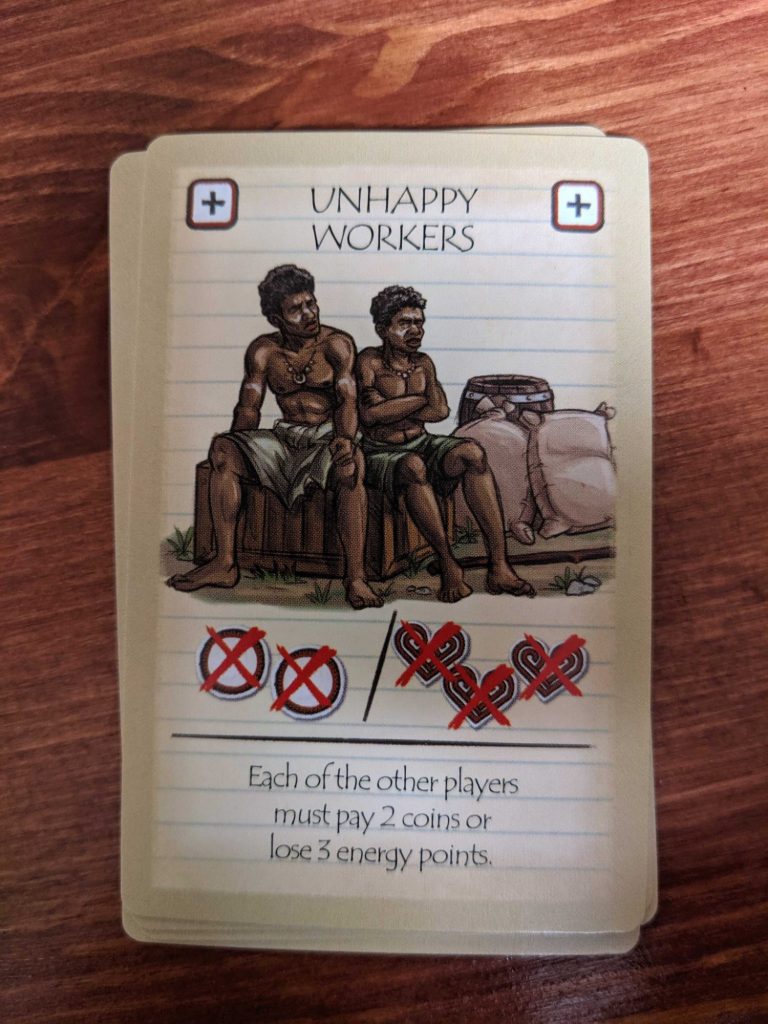
I’m not a historian, nor do I pretend to be one on the internet. But, a cursory glance at a Wikipedia page tells me that there is more to the story of Papua, New Guinea than just nice white explorer people showing up to make contact with the natives and study bugs. There is also more to that contact than just “disgruntled workers.” There is colonialism, annexation, exploitation, and likely contact with the slave trade. You have to go out of your way to talk about the so-called Age of Exploration without talking about exploitation, genocide, and slavery.
But many games are content with erasing the nasty parts. And that is not just something that games do, but something that American culture loves to do. We do it with Gone with the Wind-style presentations of the Civil War, and we do it with our view of explorers and pioneers taming the “untamed” American frontier, in spite of there being a rich indigenous and cultural history that was erased by that colonization.
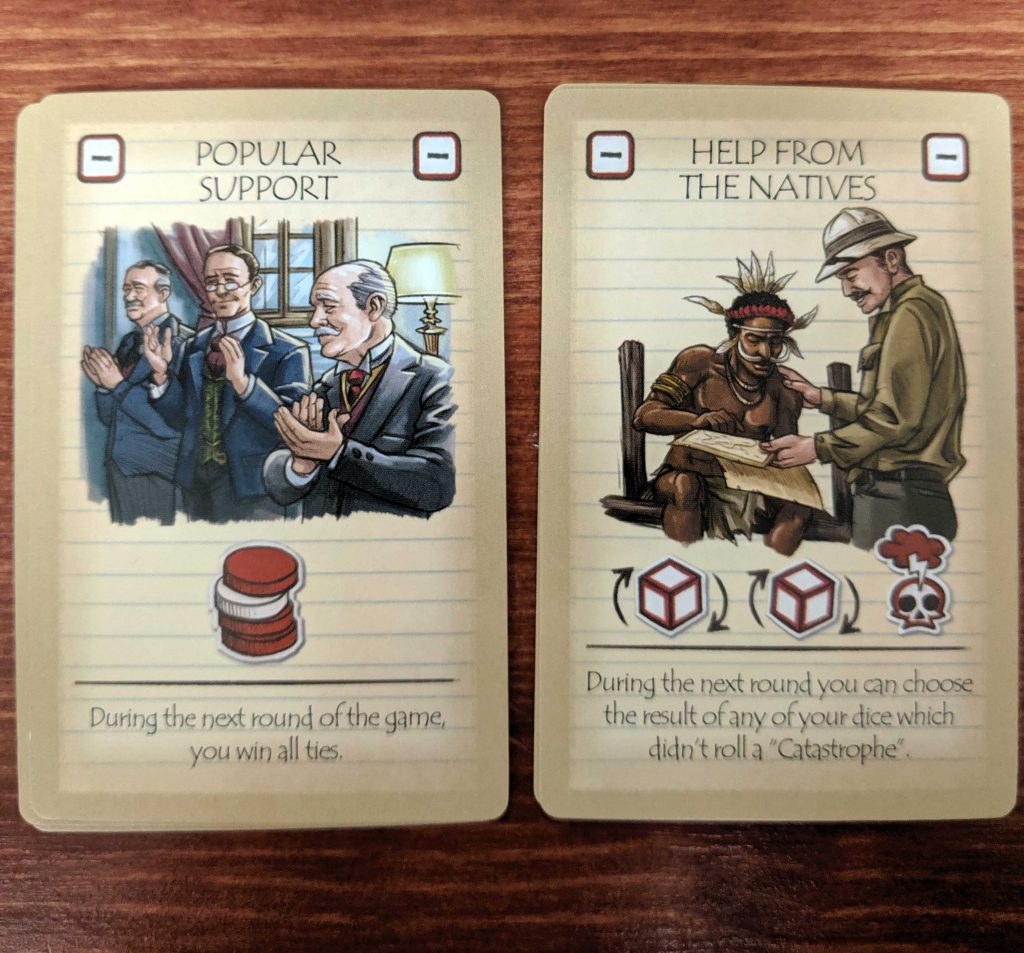
Papua is emblematic of a tendency in gaming, especially eurogames, to toss a colonial theme on top of a spreadsheet or series of mechanics without much thought to what that theme might mean. It’s a game: the theme doesn’t really matter, right? But by that very same tack, Papua could be about bugs collecting other bugs, or spacefarers flying around the universe, or cute animals exploring their home forest, and yet the designers and publishers chose “white explorers acting upon/studying black people.” On top of that, we’re playing “19th century explorers” as the opening of the rules states, and then the back has a quote from Jorge de Menezes, an explorer from 1526 (decidedly not the 19th century) who, from what I can tell, was not a very nice man, setting aside the colonialism stuff. It seems to me that this period was picked at random, or at least wasn’t very thought out. And that is a real bummer.
I get it – they wanted to make a game about exploration, and this topic seemed safe. But if the designers of Papua wanted to make a game first, and apply a theme second, there were many other options – yet, they chose this, a game that erases history in favor of pretty illustration.
And Papua is pretty; the art is very good, and the graphic design does a good job telling you what you need to do. I’m going to pause on this rant/critique now to actually describe the mechanics, because I think they’re of some interest.
The Mechanics of Exploration
Papua features several mechanics that have been popular recently, and offer interesting choices.
The game clock is driven by an energy track. When one player runs it down, the game ends. Every time you allocate an explorer (worker, in game mechanic speak), it reduces your overall energy. Every round, the board is reset, and each player in turn rolls a number of six-sided dice, and allocates their explorers at a cost of one explorer per die to a matching numbered action space on the board. There are six of these spaces, though one is blocked by the player in last place on the energy track at the beginning of each round. Additionally if you’re the first to roll a particular number that round, you get to determine which action space has that number. So every round the numbers needed to roll to utilize an action space shifts.
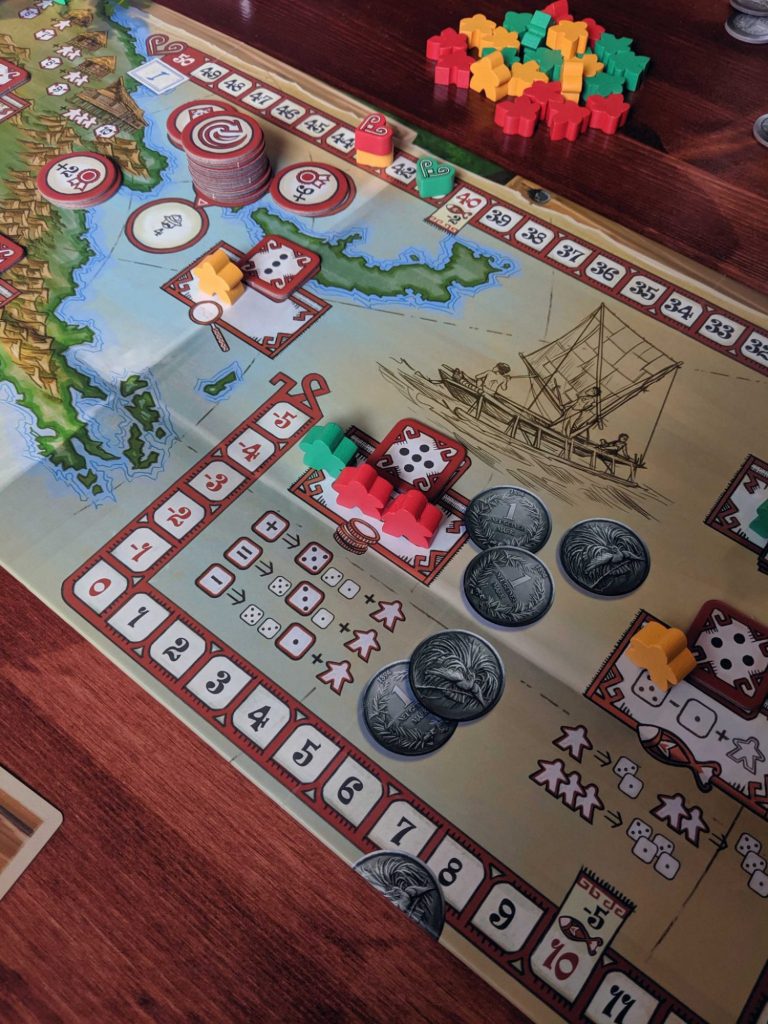
This is an interesting bit of variety, but because the game allows you to modify your rolls, Castles of Burgundy style, by spending coins the variability around assigning new action spaces each round added a bit too much unnecessary rules grit for my taste.
The action spaces, in brief:
- One features a bidding mini game where players bid behind a screen to take cards that are worth points at the end of the game.
- One allows players to use their worker placements as a bid to take reward tiles.
- Gain food (which reduces the overall energy expense of allocating workers)
- Gain coins
- Gain fancy reward tiles
- Gain special cards, and
- Increase the dice pool and allow for easier dice modification.
After all the dice rolling and action selection, the actions are resolved in order from 1-5. Some spaces place the player in competition with their opponents who put their explorers there, while others reward everyone who allocated explorers. It utilizes multiple worker placement mechanics that you see in games like Architects of the West Kingdom, Russian Railroads, and A Feast for Odin, paired with using those workers as bids as well.
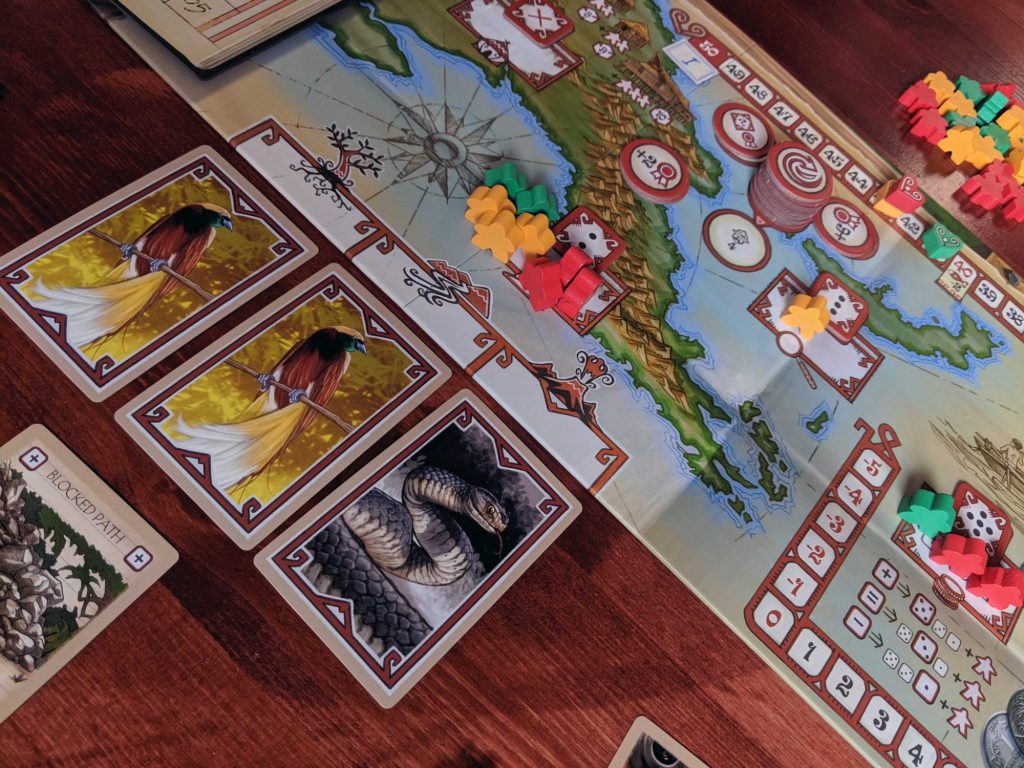
So as an experience Papua is fine. It had a little bit more rules tricksy-ness than I expect from a game of this weight, but it has interesting mechanics interacting in an interesting way, even if the game feels a bit more frantic/opportunistic than tactical most of the time. But honestly, for reasons I’ll summarize in my conclusion, I’d rather go play any of those other games, in spite of some of Papua’s interesting mechanical tweaks.
Call to Action
History, especially the history of oppression and genocide, is not pretty. It’s big and hard to deal with, and it’s easy to be like “this is just a game, don’t overreact.” But, in the context of all that bigness, all that horror, we should at least strive to be honest, and the dishonesty of games that minimize colonialism, the slave trade, or any other dark moment in history without even an attempt to open a conversation is unacceptable to me, and it should be unacceptable to anyone who cares about the so-called “future of the hobby.”
Reality is complicated. Things can be multiple things at once – games can be fun and engage with difficult concepts at the same time. I want to see more games like that, and there are games out there that do that, like Endeavor: Age of Sail. Papua is not one of those games.
Don’t go on Twitter and rip on Papua; it isn’t solely responsible, nor do the designers or developers have a hidden agenda. But the fact that games like this are released regularly, and nobody makes a stink? Hmm. The next time you pull out a copy of Archipelago, or Great Western Trail, or Puerto Rico, or any other beloved game that sidelines or marginalizes a history of violence, ask yourself – why is this game doing that, and should I be having fun with it?


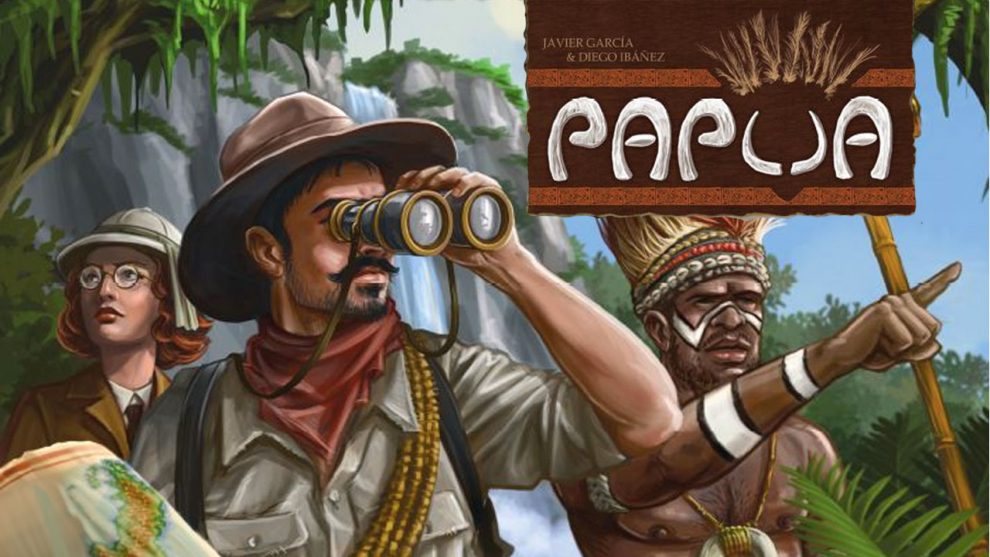

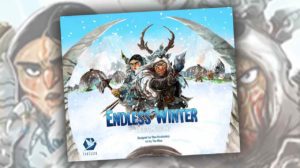
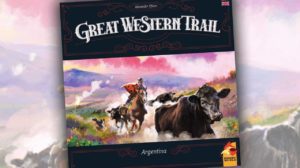





Nothing like a ton of WHITE GUILT to add to an otherwise pleasant evening. How about you just review the board game, and spare us your delicate and feeble moral judgement, eh?
Howdy, Andy Matthews, I’m the editor for Meeple Mountain. It’s pretty clear that you have strong opinions about the game so I wanted to take a minute to respond to your comment directly. FWIW I attempted to email you directly about your previous insulting comment, but the email you provided bounced; so I deleted it. The fact you posted about it again means you _really_ have something to say, so let’s chat.
I re-read Thomas’ interview and he makes it clear he thinks the game is “fine” and has a number of unique and interesting mechanisms. The reason he panned Papua is one directly of the designer and publisher’s choosing. The game might have used any number of themes, but they opted to use one of expansion and colonialism; and by doing so opened themselves up to criticism of not only the game’s mechanisms. but of the theme.
Thomas doesn’t bash it, but instead takes the time to explain the reasons for his dislike of the game. While I don’t think we should avoid a part of our collective history because something distasteful occurred, I do think that publishers have a responsibility to represent it with respect and honesty. For example Mombasa covers many of the same underlying issues, but Alexander Pfister and R&R Games opted to face it head on by referencing the primary issues with expansion in Africa in the rulebook. Also worth mentioning is An Infamous Traffic by Hollandspiele which while not the same theme, still discusses and portrays a distasteful subject with authenticity.
I also think it’s important to state that Thomas did exactly what he was expected to do; he reviewed the game. If he finds the subject matter distasteful, I expect him to be honest about it. If he thinks the game is sub par I expect him to say that as well. I’m sorry if you think “reviews” are just about covering gameplay, but that’s simply not what Meeple Mountain strives to be.
In any case, you’re welcome to your opinions and as long as you can remain civil you’re welcome to debate the merits of Papua here. Thanks for reading Meeple Mountain.
The reviewer admits that his knowledge of Papua New Guinea is limited to a “cursory glance at a Wikipedia page”. He then makes some confused and totally inaccurate comments about exploitation, genocide and slavery. To those who grew up in and know PNG it is offensive that the reviewer would so misinterpret and distort its history to include false references to genocide and slavery. Perhaps the reviewer thinks PNG is located in Africa, but there was no genocide and no slavery in PNG, which is a Pacific island nation just north of Australia. Generally, relations with the indigenous tribes, many of whom originally practiced inter-tribal warfare, headhunting and cannibalism were remarkably amicable. PNG was on the whole benevolently explored and governed by Australia until independence in 1975.
The reviewer mistakenly believes that because the game is called and set in Papua it somehow endorses or minimalises colonialism and the slave trade. It does not. The game is about exploration, discovery and trade, as are many other board games.
If such erroneous value judgements were applied to other games, then the following stand condemned:
Monopoly – promotion of capitalism and exploitation of tenants;
Cluedo – trivialisation of domestic violence and murder;
Risk – condoning warfare and territorial aggression;
Civilization – endorsing settlement expansion, cultural, military and economic domination;
Snakes and Ladders – animal cruelty(?).
Gamers could no doubt come up with more examples that could be similarly misinterpreted if the review is based on bias and ignorance.
If the reviewer had constrained himself to the playability of the game he would not have strayed into fanciful imaginations of colonial and genocidal themes, or displayed such woeful lack of knowledge of actual PNG geography and history.
Other reviews of this game, both positive and negative, are fairer and more helpful.